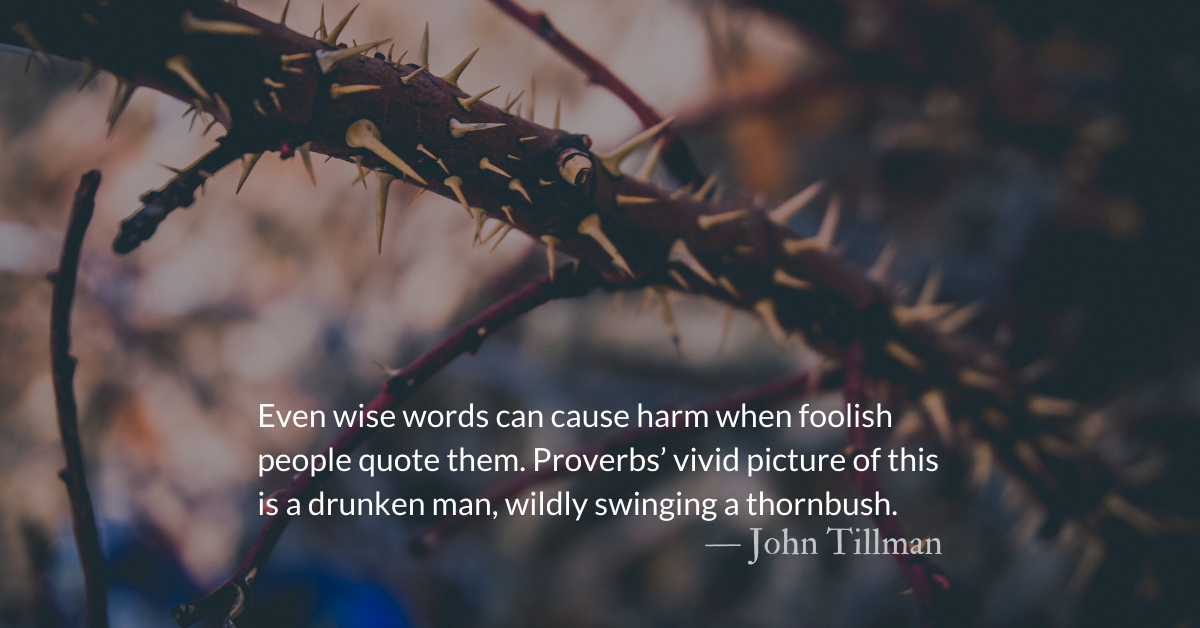Scripture Focus: Proverbs 26.4-5, 9, 12
4 Do not answer a fool according to his folly,
or you yourself will be just like him.
5 Answer a fool according to his folly,
or he will be wise in his own eyes.
9 Like a thornbush in a drunkard’s hand
is a proverb in the mouth of a fool.
12 Do you see a person wise in their own eyes?
There is more hope for a fool than for them.
Reflection: Answering Fools
By John Tillman
Answer a fool. Don’t answer a fool. This famous mirrored pair of proverbs is almost a metaphor for the entire collection. Alone, either one of them makes sense. Together they seem absurd. Surely they can’t both be right? Surely neither of them can be wrong?
Firstly, we shouldn’t become fools.
Being wise isn’t as easy as just quoting a proverb or even putting it into practice. Even wise words can cause harm when foolish people quote them. Proverbs’ vivid picture of this is a drunken man, wildly swinging a thornbush. The man, anyone around him, and anyone trying to help are likely to be harmed.
We need wisdom to know how to use wisdom. When we quote aphorisms without regard to the situation, we are like that drunken thornbush-waving fool. “Pray more.” “Have a little faith.” “Is there sin in your life?” All three of these statements are scripturally valid and, at the right time, could be wise things to say. They will also wound someone who is suffering if we wave them around wildly. To a mother whose child is sick, any of the above statements are likely to feel like an attack.
Secondly, we should pursue wisdom humbly.
Proverbs is a book of hope for fools. It calls to us to become wise and warns of something worse than being a fool — being wise in our own eyes. We all start foolish and simple. Lady Wisdom invites us to wisdom. Lady Folly whispers a lie that we’ve already arrived. Can we prevent others from falling into this trap? Can we prevent ourselves from doing so?
Do we answer fools or not? Do we try to remove the thornbush from the drunkard’s hand?
Frustratingly, I think the answer is, “sometimes.” Sometimes, perhaps we can help fools stumble toward true wisdom. Sometimes the best thing we can do is help others avoid the thornbush-waving fools. In either case, we should take care and be humble. We can’t save everyone from their own foolishness, especially when we are still at risk of it ourselves.
Whatever we can do to prevent ourselves and those around us from becoming wise in our own eyes is probably worth the risk. We may be scratched by the thorns, but so was our savior. And he endured them to save fools like us.
Divine Hours Prayer: The Call to Prayer
“Come now, let us reason together,” says the Lord. — Isaiah 1.18
– From The Divine Hours: Prayers for Springtime by Phyllis Tickle.
Today’s Readings
Proverbs 26 (Listen – 2:37)
Psalm 92-93 (Listen – 2:09)
Read more about Destiny of Grass vs Cedars
There are purposes for the flourishing of the wicked and one of them is that one day the world will see them fall.
Read more about RSVP to Wisdom or Folly
Two hostesses beckon. Which banquet will you enter? Who gets your RSVP?







